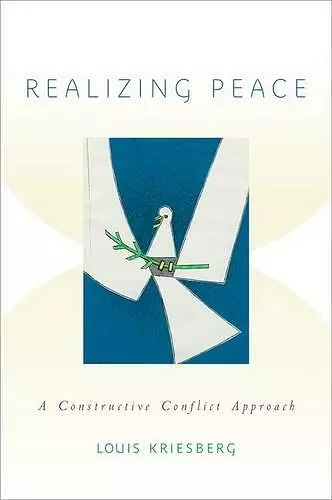Realizing Peace
A Constructive Conflict Approach
Format:Paperback
Publisher:Oxford University Press Inc
Published:16th Apr '15
Currently unavailable, and unfortunately no date known when it will be back

Early work in conflict resolution and peace research focused on why wars broke out, why they persisted, and why peace agreements failed to endure. Later research has focused on what actions and circumstances have actually averted destructive escalations, stopped the perpetuation of destructive conduct, produced a relatively good conflict transformation, or resulted in an enduring and relatively equitable relationship among former adversaries. This later research, which began in the 1950s, recognizes that conflict is inevitable and is often waged in the name of rectifying injustice. Additionally, it argues that damages can be minimized and gains maximized for various stakeholders in waging and settling conflicts. This theory, which is known as the constructive conflict approach, looks at how conflicts can be waged and resolved so they are broadly beneficial rather than mutually destructive. In this book, Louis Kriesberg, one of the major figures in the school of constructive conflict, looks at every major foreign conflict episode in which the United States has been involved since the onset of the Cold War to analyze when American involvement in foreign conflicts has been relatively effective and beneficial and when it has not. In doing so he analyzes whether the US took constructive approaches to conflict and whether the approach yielded better consequences than more traditional coercive approaches. Realizing Peace helps readers interested in engaging or learning about foreign policy to better understand what has happened in past American involvement in foreign conflicts, to think freshly about better alternatives, and to act in support of more constructive strategies in the future.
A brilliant rendering of wisdom, Realizing Peace offers a concrete and unusual gift we could summarize in two short phrases. Dream big about peace. Take practical steps to get there. Louis Kriesberg brings together decades of engaged scholarship in this seminal work to offer specific approaches, based on empirical research, for how constructive transformation of conflict can reduce and prevent violence across the globe and improve the quality of relationships. * John Paul Lederach, author of The Moral Imagination: The Art and Soul of Building Peace *
In Realizing Peace Louis Kriesberg accomplishes what few peace researchers have dared. He applies peace theory, practice and findings directly to US foreign policy. His constructive conflict approach provides a realistic strategy for enhancing US security and global peace simultaneously. This book is essential reading for 21st century diplomats and citizens alike. * George A. Lopez, Vice-President, United States Institute of Peace *
This book raises important questions about the US role in complex conflicts, the exercise of power in all its forms, and most importantly, the opportunities that exist to align the means we use more closely with the ends we seek to achieve. The book certainly will be valuable to students and practitioners of constructive conflict resolution. But, its real power will be in the hands of interested citizens who, in reading this, will ask more nuanced questions of ourselves and our elected leaders about what we are trying to achieve, what opportunities exist for constructive conflict resolution, and what choices we can make - as citizens and as a country - that best support those goals. * Andrea Strimling Yodsampa, CEO of DEPLOY/US Climate Initiative and former Chair of the Board, Alliance for Peacebuilding *
This is an important volume by one of the giants in the field of conflict analysis. It deftly summarizes the author's pioneering work in the development of conceptual frameworks for understanding and mitigating armed conflict, providing a treasure trove of the most important sources in the field. Truly encyclopedic in scope. * David Cortright, author of Peace: A History of Movements and Ideas *
Realizing Peace is an essential resource for peace and conflict studies, international relations and modern history. An invaluable learning tool for all teaching and working in the various fields of building knowledge and taking action for peace, it is a unique, hopeful and fundamentally practical work. * Betty A. Reardon, Founding Director Emeritus, International Institute on Peace Education *
ISBN: 9780190228675
Dimensions: 231mm x 155mm x 33mm
Weight: 544g
416 pages